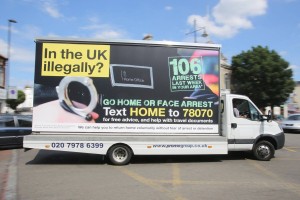Monday, July 22 heralded the controversial launch of a pilot scheme aimed at encouraging illegal immigrants to leave the UK of their own volition.
Mobile billboards, leaflets and local newspaper ads turned up in six Greater London boroughs to the consternation of local authority representatives, who raised concern that the policy would only serve to heighten tension between communities.
Immigration Minister Mark Harper said of the scheme:
“We are making it more difficult for people to live and work in the UK illegally. Every single day our enforcement officers are arresting, detaining and removing people with no right to be in the UK.
“But there is an alternative to being led away in handcuffs. Help and advice can be provided to those who cooperate and return home voluntarily.
“This pilot is just another part of the reforms of the immigration system that have cut out abuse and seen net migration drop to its lowest levels in nearly a decade. The Immigration Bill being introduced later this year will build on this work by restricting illegal migrants’ access to benefits and services.”
UKIP leader Nigel Farage condemned the campaign, suggesting it is the Conservatives’ way to shore up their support in the face of tangible competition from his party.
“What the billboards should say is please don’t vote UKIP, we’re doing something,” Mr Farage said. “That’s what it’s all about, of course it is.
“I think the actual tone of the billboards is nasty, unpleasant, Big Brother. I don’t think using messages like this will make any difference. What will make a difference is enforcing our borders properly.”
Mr Harper denied Mr Farage’s claims. “This pilot is about targeting those individuals who have no right to be in the country,” he said. “We are giving them the opportunity and assistance to leave the country voluntarily.”
The messages urge illegal migrants to text a number to get advice on returning home voluntarily to avoid arrest. The message in full reads: “In the UK illegally? Go home or face arrest.” A hotline number is also shown where illegal immigrants may receive help and advice with travel documents. Leaflets and posters are being distributed in tandem with the billboard vans in the targeted boroughs.
British Immigration Minister Mark Harper has described the new initiative as “an alternative to being led away in handcuffs.”
The new measures have triggered a heated debate with many politicians up in arms over what they have condemned as “intimidation” from the government. Ex-minister Sarah Teather attacked the Home Office, decrying the measures as “nothing less than straightforward intimidation.”
“I fear that the only impact of this deeply divisive form of politics will be to create tension and mistrust to anyone who looks and sounds foreign,” she told The Guardian.
Baroness Hanham defended the measures on Wednesday in the House of Lords, maintaining that they tackle “the reality of the situation that there are people coming here without jobs and without accommodation.”
The billboard vans are cruising some of London’s more diverse boroughs, chosen because they have a below average number of voluntary returns according to the Home Office.
Muhhamed Butt, leader of Brent council, said that the measures are likely to backfire on the Home Office and push illegal immigrants “further underground.”
“I just cannot see how this trick they are trying to use to flush out people is going to work,” Butt told reporters. “There is bound to be some impact on the community where people feel stigmatised, isolated and divided.”
Describing the scheme as “not helpful”, he went on to stress that there would be backlash that could result in illegal immigrants resorting to criminality. The labour councillor went on to draw a comparison with the 1950s wave of immigration, during which notices declaring, “No Blacks, No Irish and No dogs” were commonplace.
The Home Office said the following in their Press Release:
Voluntary returns are the most cost-effective way of removing illegal immigrants and save the taxpayer money. This pilot builds on the government’s current work on voluntary returns, which saw more than 28,000 voluntary departures last year.
The areas were chosen because they have either significantly higher or below average numbers of voluntary returns, meaning that the success of the pilot can be assessed.
Material has also been distributed in areas where illegal migrants are known to frequent, including newsagents, money transfer shops and internet cafes.
The pilot follows the launch of three consultations earlier this month which are looking to regulate illegal migrant access to public services and the right to live and work in the UK.
Forming part of the new Immigration Bill, these proposals include regulating temporary migrants’ access to the NHS, requiring landlords to check the immigration status of tenants and tougher civil penalties for rogue employers that continue to exploit illegal immigrants.










